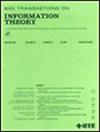Coded Distributed Computing With Pre-Set Data Placement and Output Functions Assignment
IF 2.2
3区 计算机科学
Q3 COMPUTER SCIENCE, INFORMATION SYSTEMS
引用次数: 0
Abstract
Coded distributed computing can reduce the communication load for distributed computing systems by introducing redundant computation and creating multicasting opportunities. However, the existing schemes require delicate data placement and output function assignment, which is not feasible when distributed nodes fetch data without the orchestration of a central server. In this paper, we consider the general systems where the data placement and output function assignment are arbitrary but pre-set. We propose two coded computing schemes, One-shot Coded Transmission (OSCT) and Few-shot Coded Transmission (FSCT), to reduce the communication load. Both schemes first group the nodes into clusters and divide the transmission of each cluster into multiple rounds, and then design coded transmission in each round to maximize the multicast gain. The key difference between OSCT and FSCT is that the former uses a one-shot transmission where each encoded message can be decoded independently by the intended nodes, while the latter allows each node to jointly decode multiple received symbols to achieve potentially larger multicast gains. Furthermore, based on the lower bound proposed by Yu et al., we derive sufficient conditions for the optimality of OSCT and FSCT, respectively. This not only recovers the existing optimality results but also includes some cases where our schemes are optimal while others are not.求助全文
约1分钟内获得全文
求助全文
来源期刊

IEEE Transactions on Information Theory
工程技术-工程:电子与电气
CiteScore
5.70
自引率
20.00%
发文量
514
审稿时长
12 months
期刊介绍:
The IEEE Transactions on Information Theory is a journal that publishes theoretical and experimental papers concerned with the transmission, processing, and utilization of information. The boundaries of acceptable subject matter are intentionally not sharply delimited. Rather, it is hoped that as the focus of research activity changes, a flexible policy will permit this Transactions to follow suit. Current appropriate topics are best reflected by recent Tables of Contents; they are summarized in the titles of editorial areas that appear on the inside front cover.
 求助内容:
求助内容: 应助结果提醒方式:
应助结果提醒方式:


